英语:高一下unit16-scientists-at-work-reading课件3(旧人教版)
- 格式:ppt
- 大小:1.03 MB
- 文档页数:12
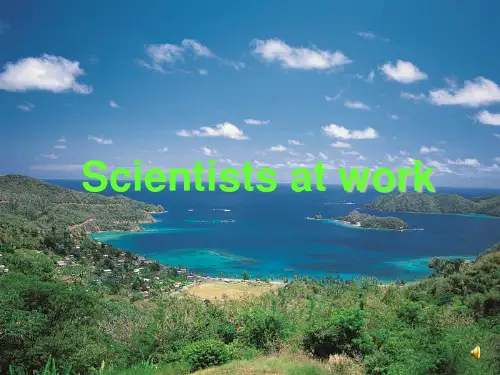
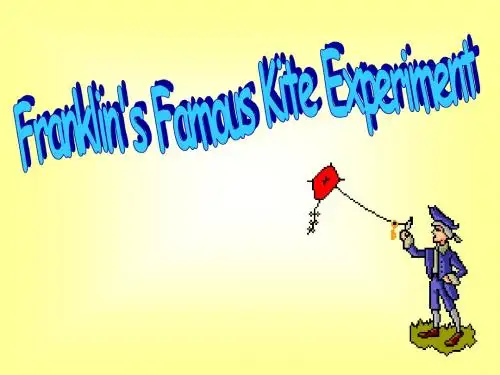
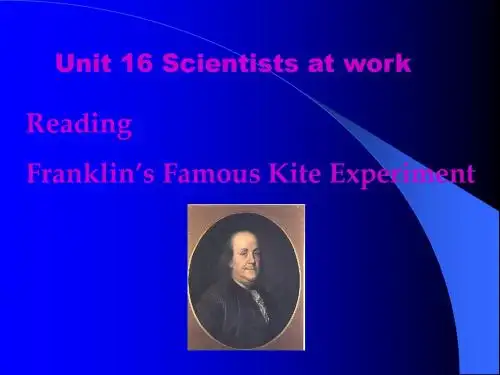
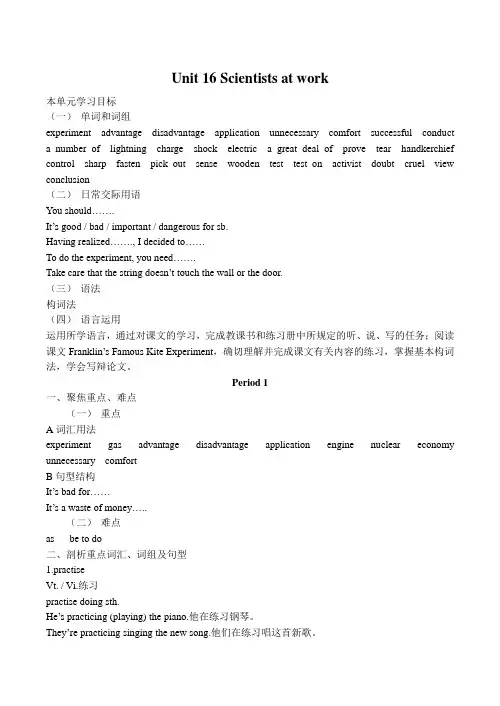
Unit 16 Scientists at work本单元学习目标(一)单词和词组experiment advantage disadvantage application unnecessary comfort successful conduct a number of lightning charge shock electric a great deal of prove tear handkerchief control sharp fasten pick out sense wooden test test on activist doubt cruel view conclusion(二)日常交际用语You should…….It’s good / bad / important / dangerous for sb.Having realized……., I decided to……To do the experiment, you need…….Take care that the string doesn’t touch the wall or the door.(三)语法构词法(四)语言运用运用所学语言,通过对课文的学习,完成教课书和练习册中所规定的听、说、写的任务;阅读课文Franklin’s Famous Kite Experiment,确切理解并完成课文有关内容的练习,掌握基本构词法,学会写辩论文。
Period 1一、聚焦重点、难点(一)重点A词汇用法experiment gas advantage disadvantage application engine nuclear economy unnecessary comfortB句型结构It’s bad for……It’s a waste of money…..(二)难点as be to do二、剖析重点词汇、词组及句型1.practiseVt. / Vi.练习practise doing sth.He’s practicing (playing) the piano.他在练习钢琴。
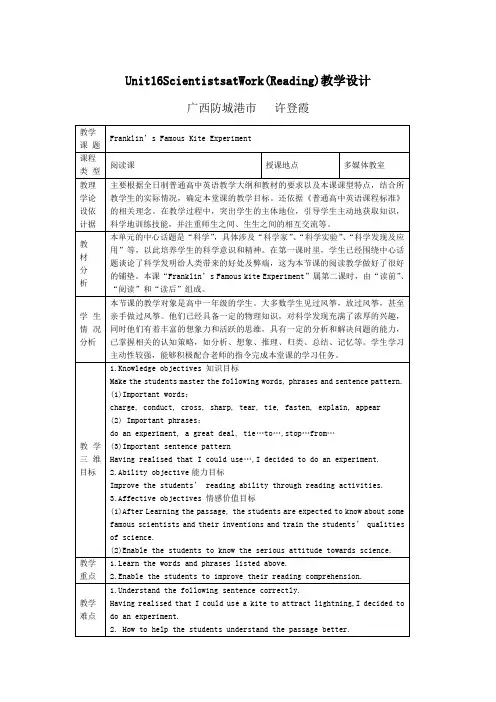
Unit16ScientistsatWork(Reading)教学设计
广西防城港市许登霞
教学过程设计
Blackboard design (板书设计)
全部内容用POWERPOINT 展示出,无板书设计。
教学目标达成的思路: 1.教学流程:
2.师生互动: 教师活动:
学生活动:
Reflection after teaching(教学反思)
在本节课中,我设置了不同的任务,让学生在活动中通过合作和探究来完成各个任务。
这些任务有的容易,有的具有一定的难度,参与性强,参与面广,以便各个层次的学生都能参与到其中去。
不同的任务设置激发了学生的学习兴趣和用英语表达的欲望。
基本做到了把课堂让给学生,让学生在自主、合作、探究的气氛中愉快度过,既顺利完成教学任务,又促进其情感教育。
课堂教学具有趣味性。
因为涉及的话题是学生熟悉的风筝的制作和与物理有关的电的知识,而且设计了精美的、条理清晰、重点突出的POWERPOINT演示文稿, 用多媒体演示富兰克林风筝试验的动画。
“教有趣,必乐学”。
学习兴趣的形成有利于激发学生的学习动机,促进学生智能的发展。
本节课的教学内容设计符合了本班学生的实际情况,难度适中,尽量满足不同类型和不同层次学生的要求。
在任务的设置中充分考虑到了学生是否能够完成。
本堂课的细节理解部分难度合适,大多数学生都能顺利完成。
总而言之,本节课的整体设计是比较完善、成功的,能从学生的实际出发,符合教学的需要。
要注意的是实际操作中时间的把握。
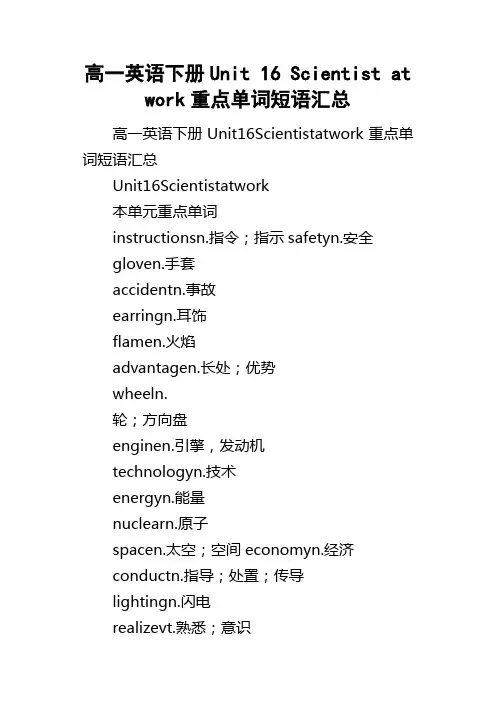
高一英语下册Unit 16 Scientist at work重点单词短语汇总高一英语下册Unit16Scientistatwork重点单词短语汇总Unit16Scientistatwork本单元重点单词instructionsn.指令;指示safetyn.安全gloven.手套accidentn.事故earringn.耳饰flamen.火焰advantagen.长处;优势wheeln.轮;方向盘enginen.引擎,发动机technologyn.技术energyn.能量nuclearn.原子spacen.太空;空间economyn.经济conductn.指导;处置;传导lightingn.闪电realizevt.熟悉;意识attractvt.吸引condensern.电容器;聚光器lastvi.持续framen.框架enoughadj.足够的controln.&vt.控制fixv.安装;肯定fastenvt.扎(捆)sharpadj.尖锐的chargen.&v.负责;充电crossn.杂交;十字架本单元重点短语inone’sopinion在某人看来awasteof…(某方面)的浪费makeuf利用befamousfor…因……而著名allover遍及makediscoveries发现anumberof一些agreatdealof大量;许多fasten…to…把……扎(捆)到……上面takecare留意;小心protect…from…保护……免受损害stop…fromdoing…阻止……不……teardown拆掉beintears含着泪花endin以……告终;结束suchas如;例如atleast至少;最少findout查清楚;弄明白goagainst与……对抗bemadeupof由……组成.高一英语下册Unit16Scientistatwork重点单词短语汇总Unit16Scientistatwork本单元重点单词instructionsn.指令;指示safetyn.安全gloven.手套accidentn.事故earringn.耳饰flamen.火焰advantagen.长处;优势wheeln.轮;方向盘enginen.引擎,发动机technologyn.技术energyn.能量nuclearn.原子spacen.太空;空间economyn.经济conductn.指导;处置;传导lightingn.闪电realizevt.熟悉;意识attractvt.吸引condensern.电容器;聚光器lastvi.持续framen.框架enoughadj.足够的controln.&vt.控制fixv.安装;肯定fastenvt.扎(捆)sharpadj.尖锐的chargen.&v.负责;充电crossn.杂交;十字架本单元重点短语inone’sopinion在某人看来awasteof…(某方面)的浪费makeuf利用befamousfor…因……而著名allover遍及makediscoveries发现anumberof一些agreatdealof大量;许多fasten…to…把……扎(捆)到……上面takecare留意;小心protect…from…保护……免受损害stop…fromdoing…阻止……不……teardown拆掉beintears含着泪花endin以……告终;结束suchas如;例如atleast至少;最少findout查清楚;弄明白goagainst与……对抗bemadeupof由……组成.高一英语下册Unit16Scientistatwork重点单词短语汇总Unit16Scientistatwork本单元重点单词instructionsn.指令;指示safetyn.安全gloven.手套accidentn.事故earringn.耳饰flamen.火焰advantagen.长处;优势wheeln.轮;方向盘enginen.引擎,发动机technologyn.技术energyn.能量nuclearn.原子spacen.太空;空间economyn.经济conductn.指导;处置;传导lightingn.闪电realizevt.熟悉;意识attractvt.吸引condensern.电容器;聚光器lastvi.持续framen.框架enoughadj.足够的controln.&vt.控制fixv.安装;肯定fastenvt.扎(捆)sharpadj.尖锐的chargen.&v.负责;充电crossn.杂交;十字架本单元重点短语inone’sopinion在某人看来awasteof…(某方面)的浪费makeuf利用befamousfor…因……而著名allover遍及makediscoveries发现anumberof一些agreatdealof大量;许多fasten…to…把……扎(捆)到……上面takecare留意;小心protect…from…保护……免受损害stop…fromdoing…阻止……不……teardown拆掉beintears含着泪花endin以……告终;结束suchas如;例如atleast至少;最少findout查清楚;弄明白goagainst与……对抗bemadeupof由……组成.。

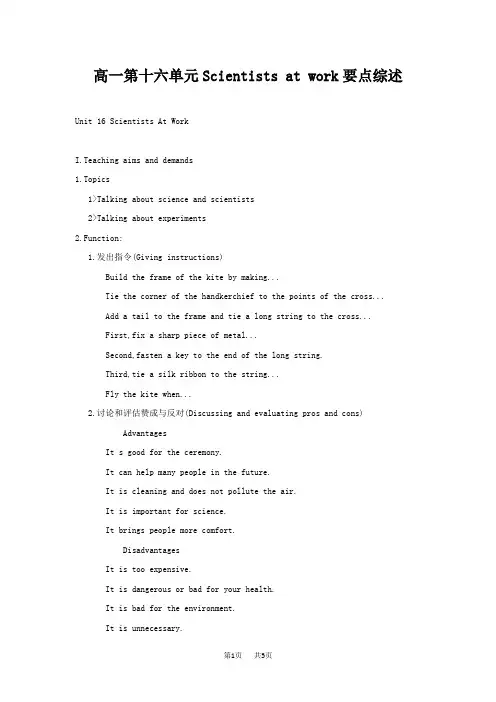
高一第十六单元Scientists at work要点综述Unit 16 Scientists At WorkI.Teaching aims and demands1.Topics1>Talking about science and scientists2>Talking about experiments2.Function:1.发出指令(Giving instructions)Build the frame of the kite by making...Tie the corner of the handkerchief to the points of the cross...Add a tail to the frame and tie a long string to the cross...First,fix a sharp piece of metal...Second,fasten a key to the end of the long string.Third,tie a silk ribbon to the string...Fly the kite when...2.讨论和评估赞成与反对(Discussing and evaluating pros and cons)AdvantagesIt s good for the ceremony.It can help many people in the future.It is cleaning and does not pollute the air.It is important for science.It brings people more comfort.DisadvantagesIt is too expensive.It is dangerous or bad for your health.It is bad for the environment.It is unnecessary.Some people will use it for other things.3.Vocabularyexperiment;glove;gas;liquid;advantage;disadvantage;engine;nuclear;comfort; unnecessary; successful; conduct; lightning; thunderstorm;string;charge;electric;shock;prove;tear;frame;kandkerchief;control;sharp; foot; fasten; sense; test; shampoo; skin; drug;activist;doubt;cruel; view; conclusiona number of; a great deal of; pick out; test on4.Grammar:构词法-----合成词foot+ball=football up+stairs=upstairsunder+storm=thunderstorm hide+and+seek=hide-and-seekII. Key points1.listening and speaking1>Why should students be careful smelling from bottles?be careful smelling[用法]also be careful to do 小心做某事[举例]John was careful not to say anything about this to her.约翰小心翼翼,避免向她提及此事。
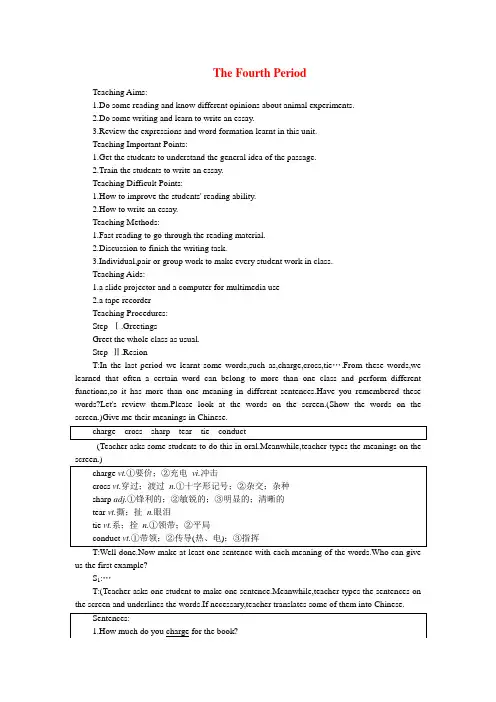
The Fourth PeriodTeaching Aims:1.Do some reading and know different opinions about animal experiments.2.Do some writing and learn to write an essay.3.Review the expressions and word formation learnt in this unit.Teaching Important Points:1.Get the students to understand the general idea of the passage.2.Train the students to write an essay.Teaching Difficult Points:1.How to improve the students' reading ability.2.How to write an essay.Teaching Methods:1.Fast reading to go through the reading material.2.Discussion to finish the writing task.3.Individual,pair or group work to make every student work in class.Teaching Aids:1.a slide projector and a computer for multimedia use2.a tape recorderTeaching Procedures:Step Ⅰ.GreetingsGreet the whole class as usual.Step Ⅱ.ResionT:In the last period we learnt some words,such as,charge,cross,tie….From these words,we learned that often a certain word can belong to more than one class and perform different functions,so it has more than one meaning in different sentences.Have you remembered these words?Let's review them.Please look at the words on the screen.(Show the words on theus the first example?S1:…T:(Teacher asks one student to make one sentence.Meanwhile,teacher types the sentences onStep Ⅲ.ReadingT:Nowadays science and technology is developing fast in many fields especially in medicine.Scientists keep developing new medicines to treat all kinds of diseases,which were hard to cure in the past.After a new medicine is developed,it must be tested on animals before we use it.Do you know this?Ss:No.T:This is very important.Almost every medicine we use has been tested on animals.Every year many animals die in experiments to develop and test new medicine.Do you think it's fair for humans to do this?Today we'll read a passage about animal experiment.Before reading,we first(Teacher asks students to read the new words several times and try to remember them.)T:Now open your books on Page 20 and read the passage quickly and answer the questions on the screen.T:Have you finished?Let's check the answers.Who can answer the first question?S3:Medical scientists say that animal experiments have been very important to find new medicines.Almost every medicine we use has been tested on animals.T:What about the second question?S4:Becasue they think animals and humans are not the same.What works with animals often does not work with humans.S5:Because they think animals have the same rights as human beings.There are laws to protect the animals.Humans have no right to kill them.T:Good.I think you understand the story very well now.Scientists and animal rights activists have different ideas about animal experiments.In the text,you should pay attention to these phrases:such as,test…on…,at least,There is no doubt that…,fight for.(Teacher writes them on the blackboard.)correctly.)Step Ⅳ.Listening and ReadingT:Now,I'll play the tape for you to listen.The first time I play it,just listen.The second time,you can follow and repeat it.And then read the passage aloud by yourselves.Are you clear about that?S s;Yes.(Teacher plays the tape twice and then gives the students to read the passage.Step Ⅴ.WritingT:We know the passage which we just read is about different ideas whether we should test medicines and other products on animals.What's your opinion?Please write an essay to give your opinion about using animals in scientific experiments.Before writing it,please read the tips.According to the tips,make an outline for your essay in groups.(Teacher gives students enough time to read the tips and make an outline.Then check the outline and then write it on the blackboard.)Outline:Paragraph 1:Explain the reasons why animals are used in experiments.Paragraph 2:Explain why you are for or against the idea.Paragraph 3:Explain why some people who have different opinion from you are wrong.Paragraph 4:Give your conclusion.T:Now we have made an outline.Please work in groups to write an essay.Let's begin.(Teacher gives students enough time to finish the essay.Then teacher asks some students to read it.)T:OK.Have you finished?S s:Yes.T:Now,who'd like to read us your essay?S6:Let me try.Nowadays…(The student reads his/her essay to the rest of the class.)T:Very good.After class,you should copy the essay in your exercise book.Sample passage:Nowadays many animals are used in experiments to test new medicines and other products,such as shampoo,skin,creams and new cancer drugs.I think animal testing is very important to find new medicines.Animal testing has helped develop medicines against many diseases.If a medicine works with animals,there is a very high chance that it also works with people.But some people say what works with animals often does not work with humans and that humans have no right to use animals in experiments.Humans should take care of animals,but I think it is the best way to test new medicines by far and after all human life is more important than animal lions of animals are killed for ing animals for medical science is more important.Animals are human's friends.Without animals,humans can't live.But sometimes,we need them to do some experiments.I think we'll try to use fewer animals and take better care of them.Step Ⅵ.TestT:In this unit,we've learnt many useful phrases and sentence patterns.Now I'll give a test toSuggested answers:1.doing an experiment2.doesn't work3.to be sleeping4.been charged5.a great deal of6.stopped7.test8.There is no doubt9.in tears10.Having knownStep Ⅶ.Summary and HomeworkT:In this class,we've done some reading and writing.We've learnt how to write an essay to express your own opinion.We've also reviewed some words and useful expressions in thisunit.After class,go over all the important points we have learnt in this unit and describe an experiment in English.That's all for today,calss is over.Step Ⅸ.Record after Teaching____________________________________________________________________________________________________________________________________________________。
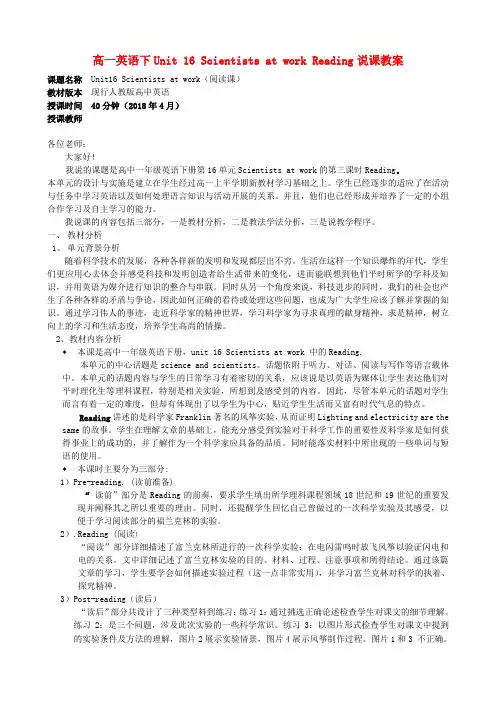
高一英语下Unit 16 Scientists at work Reading说课教案课题名称Unit16 Scientists at work(阅读课)教材版本现行人教版高中英语授课时间 40分钟(2018年4月)授课教师各位老师:大家好!我说的课题是高中一年级英语下册第16单元Scientists at work的第三课时Reading。
本单元的设计与实施是建立在学生经过高一上半学期新教材学习基础之上。
学生已经逐步的适应了在活动与任务中学习英语以及如何处理语言知识与活动开展的关系。
并且,他们也已经形成并培养了一定的小组合作学习及自主学习的能力。
我说课的内容包括三部分,一是教材分析,二是教法学法分析,三是说教学程序。
一、教材分析1、单元背景分析随着科学技术的发展,各种各样新的发明和发现都层出不穷。
生活在这样一个知识爆炸的年代,学生们更应用心去体会并感受科技和发明创造者给生活带来的变化,进而能联想到他们平时所学的学科及知识,并用英语为媒介进行知识的整合与串联。
同时从另一个角度来说,科技进步的同时,我们的社会也产生了各种各样的矛盾与争论,因此如何正确的看待或处理这些问题,也成为广大学生应该了解并掌握的知识。
通过学习伟人的事迹,走近科学家的精神世界,学习科学家为寻求真理的献身精神,求是精神,树立向上的学习和生活态度,培养学生高尚的情操。
2、教材内容分析♦本课是高中一年级英语下册,unit 16 Scientists at work 中的Reading.本单元的中心话题是science and scientists。
话题依附于听力、对话、阅读与写作等语言载体中。
本单元的话题内容与学生的日常学习有着密切的关系,应该说是以英语为媒体让学生表达他们对平时理化生等理科课程,特别是相关实验,所想到及感受到的内容。
因此,尽管本单元的话题对学生而言有着一定的难度,但却有体现出了以学生为中心,贴近学生生活而又富有时代气息的特点。
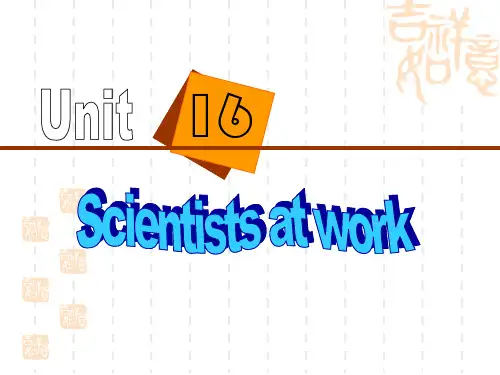
高一英语下册第四单元重点解析:Scientists at work(人教版)高一英语下册第四单元重点解析:Scientists at work(人教版)【Scientists at work知识点】疑难详解1. In the 18th century, Benjamin Franklin cinducted a number of experiments in which he showed what electricity is.在18世纪,本杰明富兰克林进行了许多次关于电的实验。
[问]...in which he showed what electrivity is. in + which 引导定语从句,修饰先行词experiments。
这里which不能由that替换。
(2)...what electricity is 宾语从句,做show的宾语。
(3)A number of...“许多,大量”,接可数名词复数,谓语要用复数形式;the number of...“……的数量”谓语动词应该用单数。
例如:A number of peasants are working inthe fields with the sun burning in the shy. 许多农民顶着烈日在地里耕作。
2. Having realized that I could use a kite to aftract lightning.I decided to do an experiment. 当我意思到能用风筝来接收闪电后,我决定做个实验。
[问]Having realized that ... 在句子充当什么成分?[答]Having realized that ... 现在分词短语做时间状语。
(=when I had realized that I could use a kite to attract lightning, ...)3. Most kites are made of paper, but a kite made of silk will last longer in weather with rain and strong winds. 大多数风筝是由纸做的,但用丝绸制的风筝在雨和大风的天气中持续的时间会长一些。
Unit 16 Scientists at workLesson 1warming up, listening and speakingStep1.Warming upAsk the students to look at the four photos in the book and describe what they see.Photo 1 shows students at work in a chemistry lab.Photo 2 shows an English book called Hamlet, a dictionary and a notebook.Photo 3 shows two students doing an experiment.Photo 4 shows students looking at something through a microscope. Step2. ListeningFrom the four photos we know that we often do some experiments at school. But do you know how to behave in a science lab? Now let’s listen to a dialogue. It will tell us what to do and what not to do.Listen for the first time and do Ex1.Then check the answers with the class.Listen for the second time and do Ex2.Listen again,let the students check their answers.Then check the answers with the class.At last,listen again and let the students find out the sentences which contain the answers.Step3.SpeakingNow let’s talk about the great work of scientists,a high-speed maglev train.Read the dialogue and talk about ther advantages and disadvantages of it, using the useful expressions in the column.Then listen to the dialogue and pay attention to the pronunciation,stress and intonation.At last, explain some language points.1.a waste ofIt’s a waste of money/time.2.mean to do sthmean doing sth3.make a noise4.make use ofmake good/full/little use ofHomework;Read rhe dialogueGrasp the language pointsLesson 2ReadingStep 1. RevisionStep 2. Pre-ReadingDo you know the names of some famous scientists? Do you know Benjamin Franklin? And what is he famous for? Today we will read about him.Step 3. General readingRead the passage to get the main idea of it. Then do Ex1 on page 25. Step 4. Fast-readingRead the passage again and do the following exercise.1. Scientists knew what electricity is for the 1st time______.A.in June 1752B.before 1752C.after 1752D.in the 19thcentury答案:A2.Which of the following is in the correct order?a.The experiment proves that lightning and electricity are the same.b.The kite flew high in the rainy shy.c.He made a silk kite.d.Very sharp piece of metal was fixed.e.A key was fastened to the end of the string.f.A ribbon was tied to the string.A.d, e, f, c, b, aB.c, d, e, f, b, aC.d, c, e, f, a, bD.c, d, e, f, a, b答案:D3.Franklin made the kite of silk because______.A.wet silk does not conduct electricityB.silk kite flies highC.silk kite will last longer in weather with rain and strong winds D.silk kite is cheaper答案:C4.Text 2 is meant for ______.A.expertsB.scientistsC.common readersD.officials答案:C5.Which is not stated but can be inferred from Text1 ?A.Franklin did the experiment with the kite.B.Franklin’s experiment with electricity was dangerous.C.Franklin failed the experiment again.D.The experiment was conducted in bad weather.答案:BStep 5. ListeningListen to the tape of the passage and pay attention to the pronunciation and intonation.Step 6. Language points1.experiment: n.do an experimentmake an experimentperform an experimentconduct an experimentcarry out an experiment2.conduct: vt.He conducted me around the museum.He conducted the orchestra.The manager conducted his business carefully.3.charge: vt.(1)使….充满He’s charging a battery.(2)索价,收费He charged us 10 dollars for mending this pair of shoes.n.in charge 主管in charge of 负责in the charge of 由….负责4. prove: vt. 证明,证实The facts prove that he is honest.He has proved his courage in the battle.He proved himself to be a true man.系动词: 证明是….The way proved to be useful.He proved a successful manager.5.take care to dotake care that 从句Take care not to fall into the river.Take care that you don’t get run over when crossing the street.Homework:Read the text.Lesson 3language studyStep 1. RevisionReview some language points.Step 2. Word studyLet the Ss do it by themselves.Then check the answers with the class.Step 3. GrammarFirst ask the Ss to look at the examples.Then let them do the exercise.Then check the answers.Step 4. PracticeFirst do Ex1 on Page90 of the workbook.Then Ex2.At last Ex1 and 2 on Page91.Homework:Review what we have learned this class.Lesson 4Reading and writingStep 1. RevisionStep 2. Lead-inWe have learned something about science experiments, but have you knownabout animal experiments? Are you for them or against them?Today we will read “Animal Experiments〞.Step 3. ReadingRead the passage quietly and carefully to do the following exercise. 1.Which of the following is true ?A.Every year 2.5 million animal die in experiments.B.Animals are only used to test new medicines.C.Scientists say animal testing does not work.D.Almost all the medicines people use have been tested on animal.答案:D2.Animal right activists are _______.A.doctorsB.people who defend animal rightsC.officialsD.scientists答案:D3.What’s a painkiller ?A.杀手B.安慰剂C.止痛剂D.救心丸答案:C4.Text 2 is mainly about _______.A.divergence () on animal experimentsB.the results of animal experimentsC.the process of animal experimentsD.loss of animal experiments答案:A5.What’s the writer’s attitude towards animal testing in Text 2 ?A.Neutral.B.Supportive.C.Indifferent.D.Against.答案:AStep 4. ListeningStep 5. Language pointsa)be used to do sth.Used to do sthBe/get used to doing sthb)allow vt.Allow doing sth.Allow sb to do sth.We don’t allow smoking here.We allow him to enter the house.c)doubt vtI doubt if/whether he’ll succeed.I don’t doubt that he’ll be successful.Do you doubt that he’ll be doubt?n. 后接同位语从句There is no doubt that he’ll be doubt.Is there any doubt that he’ll be doubt?I have some doubts whether he’ll be successful.d)make clear 说明白,说清楚You’d better make your meaning clear on this matter.Step 6. WritingWrite a passage about what to do with animal experiments in the future and why.Homework:Finish writing.。
高一英语下册 Unit16 Scientists at work(第一课时)教案大纲人教版第一册Ⅰ.Teaching Goals:1.Think and talk about science and scientists.2.Learn how to give instructions.3.Study rules of word formation.4.Learn to write an argumentative essay.Ⅱ.Teaching Time:Four periodsⅢ.Background Information:1.Great Inventions伟大发明There have been many great inventions,things that changed the way we live.The first great invention was one that is still very important today—the wheel.This made it easier to carry heavy things and to travel long distances.For hundreds of years after that,there were few inventions that had as much effect as the wheel.Then in the early 1800's the world started to change.There was little unknown land in the world people did not have to explore much any more.They began to work instead to make life better.In the second half of the 19th century many great inventions were made.Among them were the camera,the electric light and the radio.These all became a big part of our life today.The first part of the 20th century saw more great inventions:the helicopter in 1909;moves with sound in 1926;the computer in 1928;and jet planes in 1930.This was also a time when a new material was first made.Nyloh came out in 1935.It changed the kind of clothes people had been wearing.The middle part of the 20th century brought new ways to help people get over diseases.They worked very well.They made people healthier and let them live longer lives.By the 1960's most people could expect to live at least 60.By this time most people had a very good life.Of course new inventions continued to be made.But man now had a desire to explore again.The world was known to man but the stars were not.Man began looking for ways to go into space.Russia made the first step.Then the United States took a step .Since then other countries,including China and Japan,have made their steps into space.In 1969 man took his biggest step away from the earth.Americans first walked on the moon.This is certainly just a beginning thought.New inventions will someday allow us to do things we have never dreamed of.2.The First Planes最早的飞机Steam engines were first to be tried in planes,but they were too heavy to be really useful.In 1884,such a machine was made,which consisted of a large number of wings one above the other and was driven by a steam engine.It is said that it rose for a moment off the ground.Another rose,but fell and was damaged.The real success of planes began only when petrol engine was used in planes.On December 17,1903,Orville Wright,an American,flew safely in a heavier-than-air machine for twelve seconds.He and his brother Wilbur had made a lot of experiments and had taken greattrouble to study the art of flying in gliders before they tried to fly their planes.Orville came down safely after the first short flight,and on the same day the experiment was repeated three times.The longest of these flights lasted 59 seconds.The speed of the plane was 35 miles an hour.The two brothers went on with their experiments after their first success,and in 1908 Wilbur gave some exhibitions of flying in France.All the people who saw the exhibitions were greatly surprised.Soon after the Wright brothers succeeded in their experiments,others followed in their footsteps.Louis Bleriot,a Frenchman,flew across the English Channel in 1909.Prizes were given for flights from place to petition began later.The plane improved more and more when people began to understand it better.In 1919 Sir John.Alcock and Sir Arthur Brown made the first flight across the Atlantic Ocean,and in the same year a plane flew from England to Australia.And then,the age of air travel arrived.The First PeriodTeaching Aims:1.Learn and master the following words:experiment gas flame wheel engine nuclear economy unnecessary comfort2.Do some listening.3.Do some speaking to talk about advantages and disadvantages of many science discoveries.Teaching Important Points:1.Improve the students' listening ability.2.Improve the students' speaking ability by discussion,talks and making some dialogues.Teaching Difficult Points:1.How to finish the task of speaking.2.How to make dialogues correctly.Teaching Methods:1.Warming up to arouse the students' interest in science experiments.2.Listening activity to help the students go through the listening material.3.Making simple dialogues to practise the students' speaking ability.4.Individual,pair work or group work to make every student work in class.Teaching Aids:1.a tape recorder2.a projector and a computer for multimedia useTeaching Procedures:Step Ⅰ. GreetingsGreet the whole class as usual.Step Ⅱ. Lead-inT:Now you learn several subjects at school,such as,maths,Chinese,English,physics,chemistry and so on.Which do you like best?Why?Any volunteers?S1:I like English.My wish is to go abroad some day,so I like English and I want to learn it well.S2:I like biology.I want to become a scientist to explore the secrets of life.S3:I like physics.I'm interested in electricity.I want to know more about it and make more use of it to make our life better and better.S4:…T:When I was your age,I often did experiments at school.(Teacher writes the word“experiment”on the blackboard.)Do you know the meaning of the word“experiment”?“Experiment”means“trial made in order to prove the truth of an idea”.For example,I hope to find the answer to this problem by experiment.(Write the example on the blackboard.)Do you often do experiments?S5:Yes.We often do experiments in physics,chemistry and biology in the labs or in the classroom.T:Do you do experiments by yourselves or do them with your teachers?S6:Most of the time,we make experiments by ourselves in the labs and we are directed by ourselves in the labs and we are directed by our teachers.In the classroom our teachers often show us some experiments.Step Ⅲ. Warming upT:OK.You have made many experiments.Can you describe some simple ones in English?Now,I'll show you three pictures on the screen.Please look at them carefully and then describe them.While doing this,the questions on the screen can help you.Please prepare this in pairs.(Teacher shows the questions and pictures on the screen.)Questions:1.Describe what you see in each picture.What is it about?2.What are the names of the school subjects in which you study science?3.Give an example of what you learn about for each field of science.No.1 No.2Picture 1Picture 2 Picture 3(Students begin to talk about the pictures and teacher goes among them and joins them.A few minutes later,teacher asks three students to describe them before class.)T:Are you ready?(Ss:Yes.)Who can give us a description of the first picture?S7:I'll try.This is an experiment in biology.From the picture,we can see two covers made of glass.The mouse dies after it's put into the first cover because of lack of oxygen while the mouse in the second cover is still living,because there is a plant in it.From this experiment,we know that green plants can produce oxygen.T:Very good.Now we'll go on to talk about the other two pictures.S8,the second picture.S8:…Sample writingIn picture 2,we can see an experiment of electrification by friction.In the experiment,the ruler after rubbed is put near the small pieces of paper.The pieces of paper are attracted onto the ruler.The experiment shows that electricity can be produced after two objects are rubbed.That's very easy and interesting.Picture 3 shows an experiment of the boiling of water in physics.In the picture,we can see the water in the test tube is turned into steam after heated.Then the steam meets the cold piece of glass and is turned into drops of water again.The experiment suggests that the form of water can be changed,but it can't turn into other things.Step Ⅳ. ListeningT:OK.When you are doing experiments,what should you pay attention to?Can you tell me your ideas?S9:We shouldn't enter the lab without a teacher.When we are there,listen to the teacher.S10:We should follow the teacher's instructions.Don't touch anything without the teacher's permission.Some of the instruments are dangerous.S11:…T:Very good.Next we'll do some listening practice.Let's see what Mrs Zhu talks about to the students.Now open your books to read the two exercises.In them,there are two new words:gas and flame.(Teacher writes them on the blackboard.)“Gas”means “substance like air and it can't be seen”;“flame”means“red or yellow burning gas and it can be seen.”Are you clear about the two words?S s:Yes.T:I'll give you three minutes to read the exercises to make sure you know what to do.(Three minutes later.)T:Now listen to the tape.For the first time,you just listen to get the general idea.When I play the tape for the second or third time,you'll try to finish your exercises.Are you clear?OK.Let's begin.Listen carefully.(Teacher plays the tape for the students to listen.When students are doing Ex.2,teacher should pause the tape for the students to write down their answers.At last,check the answers with the whole class.If necessary,play the tape once more.)Step Ⅴ. SpeakingT:Let's do some speaking.In this part,there are also a few new words.First let's learn them.Look at the screen.Teacher asks students to read the new words together,then gives them two minutes to remember the words.)T:There is a dialogue between two men in this part.They are talking about the advantages and disadvantages of a high-speed Maglev train from Shanghai to Pudong Airport.Now,please read the dialogue quickly and then find out its advantages and disadvantages.(After a while,teacher asks students to say the advantages and disadvantages.Meanwhile, teacher shows them on the screen.)them on the Bb.)in my opinion__________I think.In my opinion,he is clever.a waste of moneyDon't buy an expensive computer.I think it's a waste of money.make more/full/good use ofWe should make more use of every minute to study.(Teacher asks students to translate them into Chinese.)T:The work of scientists is often discussed.There are advantages and disadvantages to many science discoveries.Don't you think so?Now there are four inventions for us to discuss.While you are discussing them,the useful phrases on Page 18 can help you.(Students are divided into four groups.Each group talks about one invention.Teacher gives students enough time to prepare it and then asks them to give their ideas in front of the class.After that,teacher shows them on the screen.)Step Ⅵ.Summary and HomeworkT:Today we've talked about some pictures and known how to describe some simple experiments.We've also done some listening and speaking practice.Now we know how to discuss the advantages and disadvantages of some inventions.Meanwhile,we've learned some useful phrases.After class,remember the phrases and make a dialogue to talk about advantages and disadvantages of some inventions,using the information learnt today.Class is over.Sample dialogueA:Today I read a piece of news in the newspaper.It says that another cow has been cloned in our country.B:Really?The technique is very useful.It can save some rare species.Many animals will not die out.A:Are there any other advantages?B:Yes.It can be used to increase the number of some kind of animal in a shorter period if thistechnique is widely used.But it is impossible to do so at present in any country.It's said that some parts of human body can also be cloned.A:This is useful in medicine.But if humans can be cloned,that will be terrible.The whole society will be confused if it is not used properly.B:I am sure that scientists will agree on that in the future.Step Ⅶ.The Design of the Writing on the BlackboardStep Ⅷ.Record after Teaching____________________________________________________________________________________________________________________________________________________。